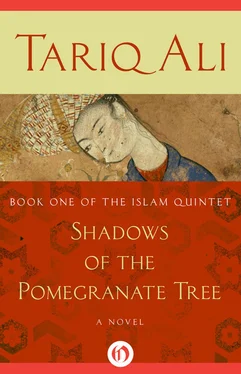Tariq Ali - Shadows of the Pomegranate Tree
Здесь есть возможность читать онлайн «Tariq Ali - Shadows of the Pomegranate Tree» весь текст электронной книги совершенно бесплатно (целиком полную версию без сокращений). В некоторых случаях можно слушать аудио, скачать через торрент в формате fb2 и присутствует краткое содержание. Жанр: Современная проза, на английском языке. Описание произведения, (предисловие) а так же отзывы посетителей доступны на портале библиотеки ЛибКат.
- Название:Shadows of the Pomegranate Tree
- Автор:
- Жанр:
- Год:неизвестен
- ISBN:нет данных
- Рейтинг книги:4 / 5. Голосов: 1
-
Избранное:Добавить в избранное
- Отзывы:
-
Ваша оценка:
- 80
- 1
- 2
- 3
- 4
- 5
Shadows of the Pomegranate Tree: краткое содержание, описание и аннотация
Предлагаем к чтению аннотацию, описание, краткое содержание или предисловие (зависит от того, что написал сам автор книги «Shadows of the Pomegranate Tree»). Если вы не нашли необходимую информацию о книге — напишите в комментариях, мы постараемся отыскать её.
The savagery of the Reconquest tore apart the world of the Banu Hudayl family. For the doomed Muslims of late-fifteenth-century Spain, the approaching forces of Christendom bring not peace but the sword. Capturing the brutality of a war both military and cultural — and the price paid by the innocent — Tariq Ali opens his Islam Quintet with a harrowing and profound historical fiction.
Shadows of the Pomegranate Tree — читать онлайн бесплатно полную книгу (весь текст) целиком
Ниже представлен текст книги, разбитый по страницам. Система сохранения места последней прочитанной страницы, позволяет с удобством читать онлайн бесплатно книгу «Shadows of the Pomegranate Tree», без необходимости каждый раз заново искать на чём Вы остановились. Поставьте закладку, и сможете в любой момент перейти на страницу, на которой закончили чтение.
Интервал:
Закладка:
He stopped questioning Ibn Daud. When the tutor asked him a question, Yazid either remained silent or restricted himself to monosyllabic replies. He even stopped playing chess with him. This was an enormous sacrifice, since Ibn Daud was new to the game and had not been able to defeat his pupil even once, till the point was reached when the latter had unilaterally broken off all personal relations.
When Hind asked him to explain his behaviour, Yazid sighed impatiently and stated in the coldest possible voice that he was not aware of any abnormality in his attitude to the hired teacher. This annoyed his sister and increased the tension that had built up between them. Hind, usually ultra-sensitive where Yazid was involved, was blinded by her love for Ibn Daud. And so it was her brother who suffered greatly. Zubayda, noticing the unhappiness on the face of her youngest child, understood the reason only too well. She resolved to settle the matter of Hind’s marriage as soon as possible and decided to postpone any discussion on the subject with Yazid till that time.
Unaware that they were being observed, Hind and Ibn Daud had now reached a stage where certain crucial decisions had to be made. His hands had wandered underneath her tunic and felt her breasts, but retreated immediately.
‘Two full moons upon a slender bough,’ he muttered in a voice which she imagined was choked with passion.
Hind was not to be outdone. Her hands found a path from above his waist to the unexplored regions below which were covered by baggy silk trousers. She felt him underneath the silk. She began to stroke his thighs. ‘Soft like dunes of sand, but where is the palm-tree?’ she whispered as her fingers gently brushed the dates and felt the rising of the sap.
If any further advances were made, they would undoubtedly pre-empt the rites of the first night. But, Hind thought, if we stop now, the frustration, not to mention the long wait till our passion is finally consummated, will make life unbearable. Hind did not wish to stop. She had discarded every sense of propriety. With all her being, she wanted to make love to this man. She had taken so much vicarious pleasure from the unending descriptions supplied by maid-servants and giggling cousins in Gharnata and Ishbiliya, but now she wanted to know the real thing.
It was Ibn Daud who, realizing this, organized a hasty retreat. He withdrew his hands from her body and gently removed hers from inside his trousers.
‘Why?’ she asked in a hoarse whisper.
‘I am your father’s guest, Hind!’ His voice sounded resigned and emotionless. ‘Tomorrow I will ask to see him alone and request his permission to make you my wife. Any other course would be dishonourable.’
Hind felt the passion draining away.
‘I felt I was on the edge of something. Something which is more than just pleasure. Something indefinably pure. Now I feel on the threshold of despair. I think I have misjudged you.’
A torrent of reassurances followed. Repeated declarations of his undying love. The high regard in which he held her intelligence. He had never met another woman like her, and all the while he was talking he was also kissing every toe on her feet and muttering a special endearment to each and every one.
She did not speak. It was a silence more expressive than anything she could have said, for the truth was that having lost her temporarily, he had won her back. And yet her instinct that she had misread him was not as remote from the truth as his gestures suggested.
Ibn Daud had never been with a woman before. His decision to disrupt the lovemaking was only partly explicable by his status in the household. He was surprised at how much Hind had succeeded in inflaming him, but the real reason he had pulled back was a fear of the unknown.
Till now there had been only one great passion in the life of Ibn Daud, and that was a fellow student in al-Qahira. Mansur was the son of a family of prosperous and long-established jewellers in the port-town of Iskanderiya. He had travelled so extensively and to so many cities, including a boat journey to Cochin in southern India, that his stories had Ibn Daud in a state of perpetual enchantment. Add to that the love they both felt for good poetry and the flute, and that each had striking features and a questioning mind, and the friendship which grew up between them seems inevitable. For three years the two men lived in close proximity. They shared a room in the riwaq overlooking the mosque of al-Azhar.
It soon became a triune relationship which concurrently fed their intellects, their religious emotions — they were disciples of the same Sufi shaykh — and, finally their sexual appetites. They had written poetry for each other in rhymed prose. This was composed in a language in which no pleasure was veiled from the other reader’s sight. During the summer months, when they were separated from each other by the necessity of spending time with their families, they both kept diaries in which they recorded every detail of their daily lives as well as the effects of sexual abstinence.
Mansur had died in a shipwreck while accompanying his father on a trading mission to Istanbul. The inconsolable survivor could not bear the thought of living in al-Qahira any longer. It was this, more than any desire to study the works of Ibn Khaldun, that had brought him to Gharnata. He was drawn intellectually to al-Zindiq, but after several conversations felt that, while the crafty old fox was full of genius and learning, there was a lack of scruple in the stratagems he employed to outwit an opponent. At the end of one discussion of the poetry of Ibn Hazm, Ibn Daud had remembered a similar talk with Mansur. The memory had overpowered him. He had given way to unfeigned emotion. Naturally, he had not told al-Zindiq everything, but the old man was no fool. He had guessed. It was this that was worrying Ibn Daud. Al-Zindiq was a friend of this family. What if he confided his suspicions to Hind’s parents?
As if guessing his thoughts, Hind fondled his hand and enquired innocently: ‘What was the name of the woman you loved in al-Qahira? I want to know everything about you.’
Ibn Daud was startled. Before he could reply there was a scream and shouts of laughter as the maid-servants pounced on a mortified Yazid and dragged him into the glade.
‘Look who we found, Lady Hind!’ said Umayma, grinning shamelessly.
‘Let me go!’ shouted Yazid, the tears pouring down his face.
Hind could not bear the sight of her brother upset in this fashion. She ran to Yazid and hugged him, but he kept his hands firmly at his side. Hind dried his tears with her hands and kissed his cheeks.
‘Why were you spying on me?’
Yazid wanted to embrace and kiss her, tell her of his fears and worries. He had heard how Great-Aunt Zahra had run away and never come back again. He did not want his Hind to do the same. If they had been alone he would have blurted all this out, but the smile on Ibn Daud’s face stopped him. He turned his back and ran to the house, leaving behind him a bemused and bewildered sister.
Slowly it was beginning to dawn on Hind that Yazid’s strange behaviour could only be explained in relation to her own state of mind. She had been so bewitched by those eyes, greener than the sea, that everything else had become secondary, even the voice of a lute. It was her carelessness that had upset her brother. She felt guilty. The intoxication of the embrace was all but forgotten.
The sight of a distraught Yazid reminded her of her own irritation with Ibn Daud.
‘The truth is,’ she told herself, ‘that his honourable behaviour was nothing more or less than a refusal to recognize the beauty of our passion.’
This annoyed her so much that she, who had almost burnt him with her flame, now resolved to teach Ibn Daud a few elementary lessons. He would soon discover that she could be colder than ice. She still wanted him, but on her terms. For the moment her main concern was to repair the breach with Yazid.
Читать дальшеИнтервал:
Закладка:
Похожие книги на «Shadows of the Pomegranate Tree»
Представляем Вашему вниманию похожие книги на «Shadows of the Pomegranate Tree» списком для выбора. Мы отобрали схожую по названию и смыслу литературу в надежде предоставить читателям больше вариантов отыскать новые, интересные, ещё непрочитанные произведения.
Обсуждение, отзывы о книге «Shadows of the Pomegranate Tree» и просто собственные мнения читателей. Оставьте ваши комментарии, напишите, что Вы думаете о произведении, его смысле или главных героях. Укажите что конкретно понравилось, а что нет, и почему Вы так считаете.












